- A Green Card with us
- Green Card Reviews
- Monique lives the American dream
Monique lives the American dream
When her husband Sascha won the Green Card Lottery, Monique wasn't convinced yet of their good fortune. Today, she runs multiple companies in the USA and shows others how it's done. We met her for an interview.
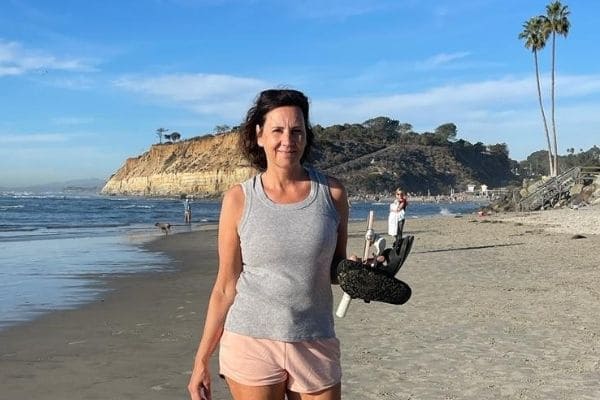
Monique at one of her favorite beaches in California. Getting here was a gigantic adventure.
Monique, when you won the Green Card, is it true that you were not convinced of your luck?
I wasn't. But my husband Sascha was. I didn't even know he had played in the Green Card Lottery. In Frankfurt, Germany, he grew up with American football and the GIs (editor's note: American soldiers). All his friends were Americans, he worked for American airlines in Germany, and it was always clear that he would move to the United States at some point.
We had often been abroad and lived in Dubai, Qatar, and Switzerland. But at some point, our son started school. So when we won the Green Card, we had been back in Germany for six years already.
I was self-employed, we had built a good life for ourselves, and we were just about to move into a new terraced corner house - that is a typically German thing. I had already packed all my boxes when my husband called me from the train. At first, I thought something bad had happened. But then he said, "We won the Green Card!"
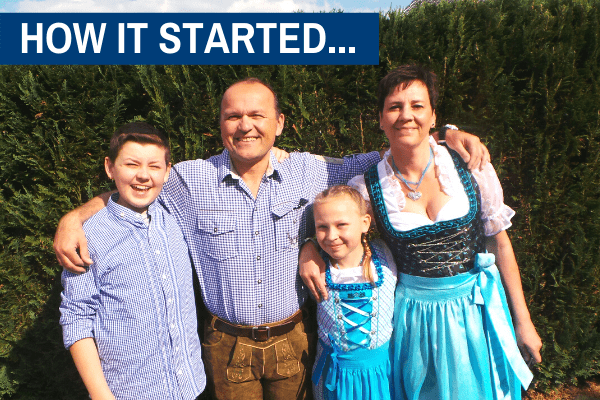
In 2014, Monique, Sascha, and their kids left their typical German life behind and moved to the United States.
How did you react to the news about winning a Green Card?
My response was something like, "Okay?" And he repeated, "WE WON THE GREEN CARD!" And I said again, "Okay? Do you want me to leave the boxes packed now?"
Of course, I didn't have to because it always takes another 1.5 to 2 years from winning to moving. Still, my first thought was, "Oh shit! We bought new furniture! My business is going great! I have a fantastic job that I love! Why should I go to America now?"
For me, it was not a dream at that time. But when things suddenly got a bit complicated with our jobs in Germany, we said: let's do it! And then we sold everything.
There was a garage sale, and people thought we weren't quite sane to sell everything now - in this newly furnished house. The brand new kids' rooms! The brand new home goods! The fact that we're moving to America just like that. And we don't even know what we're going to do there. Our kids were 8 and 12 years old. Everyone said, "The Menesi Family went nuts!"
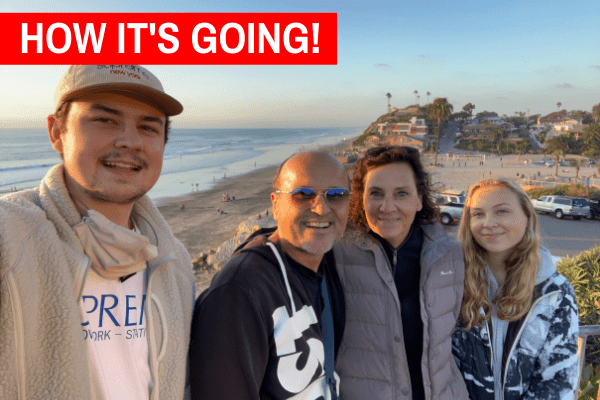
"If I had stayed in Germany, I would be gray now." Living in the USA gives Monique a lot of energy.
How did you experience the time following? After all, there's still a lot of paperwork to be done before moving to the USA.
Sascha prepared the whole process on his own. He organized everything well and also dragged me to the medical (editor's note: medical examination by a US government-approved physician). Nothing was missing!
When we got to the embassy for our interview, I asked him, "Are you him, the one I married?" I had known him to be somewhat chaotic before. But we were highly prepared for emigration. I think that was our key to success.
We had already activated our Green Cards on a short trip to Boston, so we already had them in our hands. And then we took the cheapest one-way flight there was. At that time, it was a flight to Seattle.
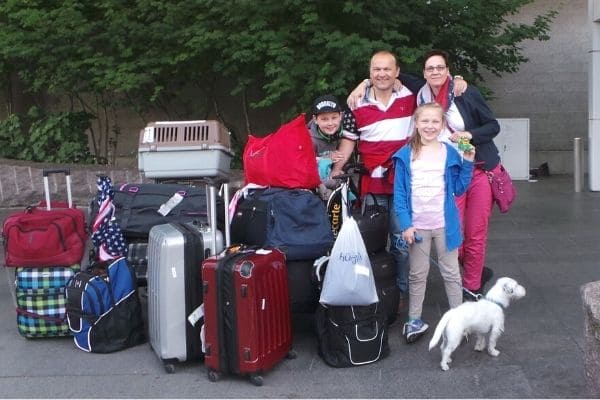
"You don't even realize it at first!" The move to the USA initially felt like a vacation.
What were your first days in the USA like?
It was a huge adventure! You don't realize it at first. It's as if you're going on a big trip, but you don't quite understand yet: that was it!
We landed in Seattle, rented an RV, and drove to San Jose near San Francisco because we have friends there. Everything we needed to open an account, apply for a social security card, get a driver's license, and rent an apartment was already translated and ready to go. And after that, it felt like a vacation.
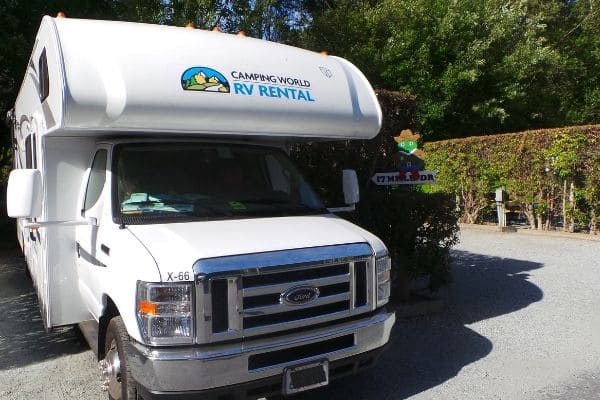
After arriving in Seattle, Monique and Sascha rented an RV and drove to California.
We looked at California and Las Vegas and even had job interviews already. But the West Coast is just too expensive for a start. Without a credit history, you sometimes have to put down two rents as a deposit, pay for at least one car in cash, and on top of that, the rents here in the West are incredibly high.
A friend of ours who had also won a Green Card then said, "Jeez, come to Florida!" There are always jobs in tourism there, and we still had a little time before school started.
So we went to Florida, rented a vacation home, and stayed there for four weeks. But that didn't work for me at all! It was hot, humid, and flat! I started looking for a return flight back then.
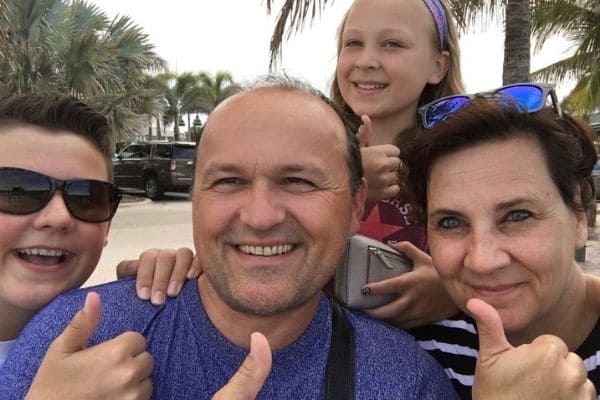
That’s not a smile: all Monique wanted to do was get out of Florida.
What stopped you from flying back to Germany?
Our friend from Florida suggested going up to North Carolina because of the mountains and the seasons. Also, we wanted a good start for the kids, and they would be able to go to school there. So that's what we did.
North Carolina! If someone had told me before, I would have responded, "Huh? Why would I go there?" But it was a blessing! I immediately found a job with a German company - also in HR, where I come from - and Sascha started working for an American bank.
We could rent a little house, the kids went to school, and things were going really well. We were in North Carolina for about a year when we realized how badly we missed the West Coast.
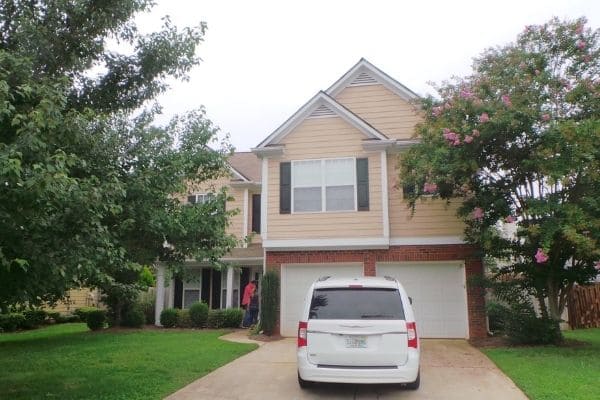
The first American house of the Menesi Family was in Charlotte in the US state of North Carolina.
We especially liked Portland, so we moved over there. . That's as far as it goes - there are about 5,000 km in between! Life in Portland was wonderful. But then - we had only been there seven months - something unbelievable happened!
We had founded our own company in Portland, meetus@US, and suddenly we got the order to staff an entire plant in North Carolina for a Mexican company. This was a huge opportunity and meant a whole year's income, so to speak.
So, after seven months in Portland, we just moved back to Charlotte and continued our recruiting and leadership development business there for two years.
And when did your second company, "Breadlovers," come along?
Like so many Germans in America, we missed good bread. That's why I started baking German sourdough bread in Charlotte at some point. However, the baking process takes a long time, and we were really busy.
So I wondered how it could be done faster. I imported dried sourdough from Germany and filled it into portions. All that was left was to add water.
Our neighbors absolutely loved our baking mix. We also presented it at an expat fair, and it was a big hit there, too! It was obvious that we had to keep going with this.
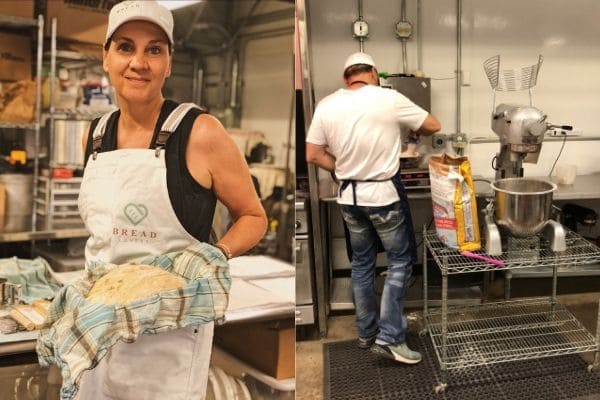
Monique and Sascha have founded their second company, "Breadlovers," in the USA out of love for German bread.
When we put the website live, people bought it immediately. That's how our company, Breadlovers, came to be. But Charlotte isn't the place for it. On the other hand, Portland is literally all about small food startups like ours. It's an actual foodie city! There's a lot of support from all sides and a lot of clientele.
Our son also wanted to go back to Portland because he didn't like it in Charlotte after two years. So we packed everything up again and moved back to Portland!
We then built our bread business alongside our recruiting and coaching business and had the bread mix launched in no time at all Whole Foods throughout Pacific Northwest. That's the largest organic supermarket chain here in the US.

The bread mix showed up in Whole Foods supermarkets in the northwestern United States within a short time.
And then, the supermarket customers came asking why they couldn't buy the bread ready-made. So we started baking bread as well. We baked at night, stirred sourdough during the day, conducted interviews, went to farmers' markets, recruited in between - you can't imagine the things we did!
At some point, we were burnt out completely. In between, we also discovered that the packaging of the bread mix wasn't good. Americans don't go searching for German sourdough bread in the supermarket, and we would have had to do a lot of work on the design. In addition, it is very cost-intensive to build up a business like this.
We knew we had to change our strategy. So we decided to sell the bread online instead of in supermarkets. It works really well, and now we have a lot more time for ourselves!
That's an example with an important message for expatriates: just because we Germans think everyone has to eat our great bread here doesn't mean Americans are going to pick it up in the supermarket.
Surely that's not your only learning from your first years of self-employment in the USA, is it?
Not at all. In the meantime, we advise many expatriates on setting up a business in the USA. Many people have a very strong vision of what they want to do in the US, but they are completely unprepared. For example, many do not educate themselves on how to read numbers here.
I have a lot of experience in building businesses, and I see a lot of ideas and potential. That's how my latest baby, Female on Fire, came about, helping women succeed with their own projects.

Four companies and one podcast: Monique is the prime example of the serial entrepreneur
What are your top 5 tips for expats who want to make a career in the US?
First, you need a visa. You have to get one before you start looking at apartments and applying for jobs. Few employers would sponsor you because wait times are too long. And even if you have all the qualifications, it's rare that a job can't be filled by a US citizen instead. The only option is to get a Green Card or to start your own business.
Second, get professional help! People suppress the fact that their business must also be suitable for the special visa process. And if they don't invest in good advice, they don't know what to look for at the beginning.
Third, pick the right region! Many expatriates want to go to Florida, California, or New York. But you have to either move to where your business is needed, or build the business that is missing in the region of your dreams. For example, we started meetus@US in North Carolina because that's where most of the German companies are.
Fourth, this is not a vacation! Many people call me to ask if I can get them a job in the US. And then they have a German resume and an empty LinkedIn profile with no connections. Why would anyone hire you with that? So get your documents up to date. If you want to live in America, you have to show your skills.
Fifth, you need startup capital! In my Muttersprache podcast, I always ask expats what they would do differently in hindsight. And the subject of money always comes up. People underestimate how long things sometimes take, even here. Especially when you come to the USA on a business visa, it can take long. Often, you also need licenses that take a lot of time. So be sure to save some money before you go to the States.
Apart from that, of course, you have to get involved with America. How to apply for a Social Security Card? How to get a bank account? How to build up a credit history? This is what burns up a lot of money for many immigrants in the first six months already because they underestimate how long it will take. Therefore, I think it is important to get specialist advice.
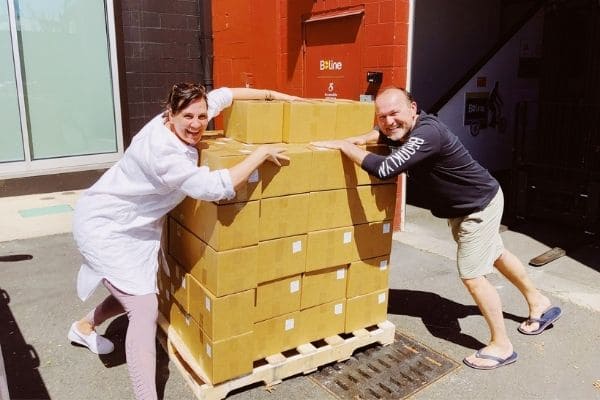
Building a business is intense. Monique and Sascha worked around the clock at the beginning. Now, they help others with their first steps in the USA.
Are there big differences between setting up a company in Germany and in the USA?
Here in the United States, you can register an LCC with the Secretary of State in five minutes and get started. In addition, you get your foot in the door much faster in America. I worked in Germany as a consultant, trainer, and coach for big companies like Lufthansa, Tui, and Otto, and I know that it's hard to get in from the outside.
The business world in Germany is less dynamic. In the US, people don't hold on to traditions as much, and you can build trust more quickly. Things are less rigid, and people are much more open.
In summary, I would say: it's much easier to start a company in the USA.
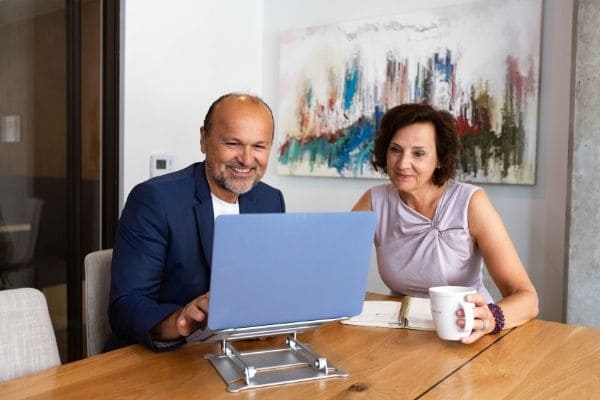
Monique and Sascha recruit employees for German companies in the USA. Moreover, Monique leads the management consultancy EQUILIBRIUM Mindful Leadership.
Is work-life in the USA easier, even without a Green Card?
When we won the Green Card back then, my husband said, "Monique, this is a jackpot!" I didn't realize it at the time, but the Green Card means you're almost on par with any US citizen.
You're free to choose who you want to work for. So I could always get a job with my Green Card at employers all over America if I wanted to. However, I meet many people here who don't have a Green Card because we use meetus@US to recruit staff for German companies in the United States.
These employers get their staff to America either on an L-visa or an E-visa. With these visas, you are only allowed to work for that one company in the USA. Of course, that's better than nothing, but you're heavily dependent, and the transition from there to the Green Card is difficult.
In the pandemic, we really saw what a difference it makes for the first time. I know many people who were unable to leave and enter the country on their investor visas during the US Travel Ban. I could fly from the USA to Germany and back with my Green Card without problems.

Monique made it in the USA. In addition to managing her successful companies, she talks to celebrities about their personal American dream in her German "Muttersprache" podcast.
Your path to the American dream was bumpy and full of surprises. What does your life look like today?
We traveled a lot after we changed strategy with "Breadlovers" and ultimately came back out to California, where we've stayed until now. I have a view of the ocean from my apartment balcony, and I go to the beach every day. Yes, we are really living the American dream now.
I have developed "EQUILIBRIUM Mindful Leadership" - a concept with online courses and many tools. I add meditation, yoga, and nutrition to leadership training. That's important because managers can only be good leaders if they know themselves well.
We also continue recruiting, we still have our bread business, and I recently started "Female on Fire," an empowerment project to help women build their businesses.

No envy! "Just do it, but do it smartly" is Monique's advice on immigrating to the USA.
Besides, I still have my podcast, through which I have met a lot of incredible people. And, of course, we still counsel expats on how to start a business.
There's always a lot of visitors here! Someone comes along almost every week to eat a fresh slice of bread with us. We also help for free sometimes because you get what you give.
Last summer, we were back in Germany for the first time in years. My dad asked me, "Monique - don't you think you could have done all that in Germany?" And I said, "Yes, but I wouldn't be the person I am now. I would probably be gray!" Life in the USA has changed me completely.
Finally, do you have any advice for anyone who dreams of living in the USA?
Just do it! Don't overthink. Get people to support you. And then, just do it.


 DE
DE EN
EN FR
FR